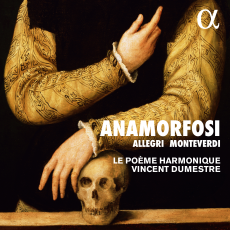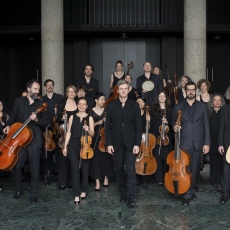Le Poème Harmonique - Allegri & Monteverdi: Anamorfosi - The Classic Review
Le Poème Harmonique, with founder Vincent Dumestre, celebrate their 20th anniversary this year. Their latest album entitled ‘Anamorfosi’ focuses primarily on baroque works that have been transformed lyrically from their secular incarnations to the sacred variants. Together they deliver 77 minutes of captivating and colorful music in a carefully paced and innovative program.
Dumestre throws open the doors, illuminating the direction of this richly inventive musical journey to 17th century Rome, with Allegri’s undoubted masterpiece “Miserere”. Listeners should dispense with all ideas of how Allegri’s Miserere should be performed; from examples such as the classic interpretation of the Choir of Kings College, Cambridge to the purity of the Tallis Scholars rendition. For Le Poème Harmonique, Allegri’s Miserere is not a stand-alone piece, it’s the starting point of a journey from which they carry the listener, onwards through a program of at times hypnotic reverence. Delving deeper beyond the simple harmonies of the “Miserere”, the group finds something new in their clashing quasi-improvised embellishments. Opening an album with such an unorthodox rendition, one takes note of Dumestre’s musical knowledge, creativity and ability to captivate.
Two solos pieces follow in this musical sequence, growing organically from the starting point, containing the same natural sense of improvisation. Luigi Rossi’s “Un Allato Messagier” (track 6), which began its life as the lament “Queen of Sweden on the death of her husband” (“Un ferito cavalier”), as the informative booklet highlights. Lyrically adapted by an anonymous author, this hybrid of aria and recitative is emotionally evocative, sung by mezzo-soprano Eva Zaïcik. Following on in a seamless transition is Claudio Monteverdi’s aria, “Si Dolce È ’L Martire”, with soprano Déborah Cachet. The consistency in the style of diction becomes immediately apparent, the Italianate pronunciation unifies not only the sequence thus far, but the entire album as one progresses through. One senses a complete unity between the players and Cachet, culminating in the last line ‘for your heart has captivated me!’, which is delivered with sincerity and musical conviction.
Returning to a psalm setting, using the techniques of falsobordone (harmonized Gregorian chant), is an anonymous setting of “Domine, ne in furore tuo” (8-10). Beginning with an A Capella section, comparable to the opening Allegri, its central section with instrumental accompaniment has a carefully balanced cornet solo, which is beautifully executed. Careful attention is played to the voicing, the tenor line comes to the fore unintrusively, highlighting the refinement and attention given to the inner polyphonic lines.
Domenico Mazzocchi’s “Breve É La Vita Nostra” (track 11) brings some well-placed drama with its contrasting textures. The “sinfonia’’ to “De La Comica Del Cielo” by Antonio Maria Abbatini (12) provided the instrumental group with their moment to shine. Fitting perfectly into the musical sequence, it evolves into “Chi Fà” by Marco Marazzoli. This brings some secular operatic drama to this sacred music, characterized by highly stylistic solos from, amongst others, Nicholas Scott and Marc Mauillon.
The final sequence returns to Monteverdi. The penultimate piece is a reworking of the madrigal “Dorinda, ah, dirò mia”, “Maria, Quid Ploras”. Adding a rich instrumental accompaniment, it is elevated to a celestial plain of beauty and majesty. The final work, which may be familiar as “Altri canti di Marte” from the eighth book of madrigals, is reworked as “Pascha concelebranda” (17-18). It brings a celebratory and uplifting close to a highly engaging recital.
Alpha has recorded this album with due care and engineered it to a very judiciously balanced sound. The acoustics of Baume Abbey, France, add to the atmospheric ambiance, giving the music a sense of context. The instrumental accompaniments are exquisite and bring an intrinsic sense of style throughout. Not an album to cherry-pick from, this is a complete musical experience to be savored. The flawless programming on this album is coherent and diligent, each work having an essence, big or small, to the Allegri “Miserere”. But as the musical journey evolves, there is a drama and reverence, maintaining a sense of momentum and intrigue. The musical standards from both singers and instrumentalists are at the zenith of period performance, making this a highly commendable release. © 2019 The Classic Review

